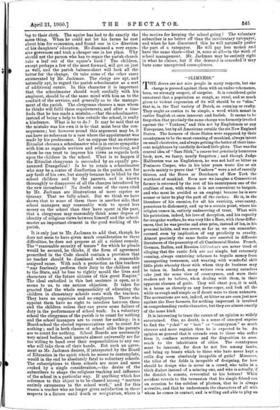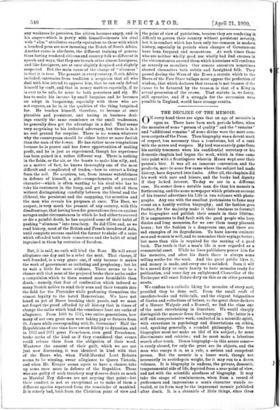"SLIMNESS."
THE Boers are not nice people in many respects, but one charge is pressed against them with an undue vehemence, born, we strongly suspect, of surprise. It is considered quite unnatural that a population so rough, so rural, and so much given to violent expression of its will should be so "slim," that is, in the Taal variety of Dutch, so cunning or crafty. They ought as rustics to be simple, a word which meant in earlier English at once innocent and foolish. It seems to be forgotten that precisely the same charge was formerly levelled against the "Yankees," and this not by Englishmen or any Europeans, but by all Americans outside the six New England States. The farmers of those States were supposed by their countrymen to be the most cunning of mankind, always intent on small cheateries, and always getting the better of their inno- cent neighbours by carefully devised little plots. That was the central idea of "Sam Slick," a coarse but genuinely humorous book, now, we fancy, nearly forgotten ; and though Judge Haliburton was an Englishman, he was not half so bitter as Fenimore Cooper, who in his later years wrote five or six novels mainly to prove that " Yankees" were a set of rascally thieves, and the Boers or Dutchmen of New York the worthiest of mankind. Even now we imagine a Connecticut farmer is esteemed by the rest of his countrymen one of the craftiest of men, with whom it is not convenient to bargain, and who must be avoided as an employe because he is sure sooner or later to play the part of the cuckoo. He is, in the literature of his enemies, for all his rusticity, over-canny, penurious to dishonesty, and up to a certain point, where his religion comes in, entirely undeserving of trust. What with his patriotism, indeed, his love of deception, and his capacity for irregular warfare, he was very like a Boer, with these differ- ences, that be was precise and even prim, instead of lax, in his personal habits, and was never, so far as we can remember, Accused even by implication of any proclivity to cruelty. Almost precisely the same faults are asserted in different literatures of the peasantry of all Continental States. French, German, Italian, and Russian liWratew's are never tired of alleging that the rustic folk are not simple, but extremely cunning, always contriving schemes to beguile money from unsuspecting townsmen, and weaving with wonderful skill little plots whereby those with whom they do business may be taken in. Indeed, many writers even among ourselves take just the same view of countrymen, and warn their readers not to believe, when dealing with them, in their apparent absence of guile. They will cheat you, it is said, in a horse as cleverly as any horse-coper, and look all the while as rough and simple as if deceit were to them unknown. The accusations are not, indeed, so bitter as are ours just now against the Boer farmers, for nothing important is involved in comprehending rustic character, but they are almost exactly of the same kind.
It is interesting to trace the causes of an opinion so widely entertained. One, no doubt, is a sense of annoyed supriso to find the " yokel " or " lout " or " countryman " so much cleverer and more roguish than he is expected to be. An opinion so general that it extends even to those who suffer from it, confines acuteness and the disposition to over- reach to the inhabitants of cities. The countryman must be innocent, for does he not live among lambs, and bring up beasts which to those who have never kept a collie dog seem absolutely incapable of guile? Moreover, the tiller of the fields is incapable of designing, for how should he design who is never in a crowd, who talks in a thick dialect instead of a mincing one, and who is actually, if the district is remote, reverential to his betters ? When accident reveals to the townsman that his simple friend can on occasion be the subtlest of plotters, that he is always secretive, and that he understands the characters of all with whom be comes in contact, and is willing and able to play on
any weakness he perceives, the citizen becomes angry, and in the point of view of patriotism, because they are rendering it his anger—which is partly with himself—invests his rival with " slim " attributes exactly equivalent to those with which a hundred pens are now investing the Dutch of South Africa. Another-cause is aloofness, the different training of genera- tions having rendered citizens and country-folk so different in speech and ways, that they are to each other almost foreigners, and like foreigners, are at once slightly despised and slightly suspected. Bat the main cause of the charge of " slimness " is that it is true. The peasant in every country, &nth Africa included, entertains from tradition a suspicion that all who deal with him intend to oppress him, that he can only defend himself by craft, and that in money matters especially, if he is ever to be safe, he must be both penurious and sly. He has to make his income by small bargains, and he becomes an adept in bargaining, especially with those who are not experts, as he is, in the qualities of the thing bargained for. He teaches himself, therefore, to become at once plausible and persistent, and having in business deal- ings exactly the same conscience as the small tradesman, he generally does get the advantage in a deal. That seems very surprising to his irritated adversary, but there is in it no real ground for surprise. There is no reason whatever why the countryman should be either better or more foolish than the man of the towns. He has rather more temptations because be is poorer and has fewer opportunities of making profit, and he is just as experienced, though his experience has been gained in a rather different way. There is nothing in the fields, or the air, or the beasts to make him silly, and, as a matter of fact, he knows thoroughly one of the most difficult and complicated of trades,—how to extract a living from the soil. He acquires, too, from intense watchfulness in defence of himself, a gift—comprehension of personal character—which is often wanting to his rival who has to take his customers in the lump, and get profit out of them without distinguishing carefully between the liberal and the illiberal, the persistent and the easygoing, the secretive and the man who reveals his purposes at once. The Boer, we suspect, is very much the peasant of any country, with this disadvantage, that having been for generations thrown against savages under circumstances in which he had either to succeed or die a painful death, he has acquired some of their habit of pushing " slimness" into treachery. So did Clive and, as we read history, most of the British and French invaders of Asia, until complete success enabled the former to shake off a taint which offended both their consciences and the habit of mind ingrained in them by centuries of freedom.
Bat, it is said, no oath will bind the Boer. He will swear allegiance one day and be a rebel the next. That charge, if well founded, is a very grave one, if only because it makes the work of government so irritating and perplexing ; but let us wait a little for more evidence. There seems to be a chance still that most of the perjured broke their oaths under a compulsion which to them seemed more formidable than death,--namely. that fear of confiscation which induced so many Scotch nobles to send their sons and their tenants into the field for the Pretender while professing themselves the utmost loyalty to the hated Hanoverians. We have not heard as yet of Boers breaking their parole, and we must not forget the proof afforded by all history that in times of change the oaths which bind the conscience least are oaths of allegiance. From 1688 to 1745, two entire generations, how many of our own great men were taking pay or favours from St. James while corresponding with St. Germaine? Half the Republicans of our time have sworn fidelity to dynasties, and in 1832 and 1871 great Frenchmen, even good Frenchmen, broke oaths of the kind as if they considered that events could release them from the obligation of their word. Whatever the amount of their guilt, which we are not just now discussing, it was identical in kind with that of the Boers who, when Field-Marshal Lord Roberts seems to be winning, swear allegiance to Queen Victoria, and when Mr. Kruger seems again to have a chance, take up arms once more in defence of the Republics. Those who are guilty of such treachery may deserve death as much as Marshal Ney did—we are not arguing that point—but their conduct is not so exceptional as to make of them a different species separated from the remainder of mankind. It is utterly bad, both from the Christian point of view and difficult to govern their country without persistent severity, but it is conduct which has been only too common in modern history, especially in periods when changes of Government have been frequent and momentous. At such times those who are neither wholly good nor wholly bad find excuses in the circumstances around them which historians will condemn as severely as moralists. Our remote ancestors sometimes showed themselves both subtle and farsighted folk. They passed during the Wars of the Roses a statute which to the Boers of the Free State valleys must appear the perfection of wisdom, that which declares that treason is not treason if the cause to be favoured by the treason is that of a King in actual possession of the crown. That statute is, we fancy, still operative, and if a struggle for the succession were possible in England, would have strange results.



































 Previous page
Previous page